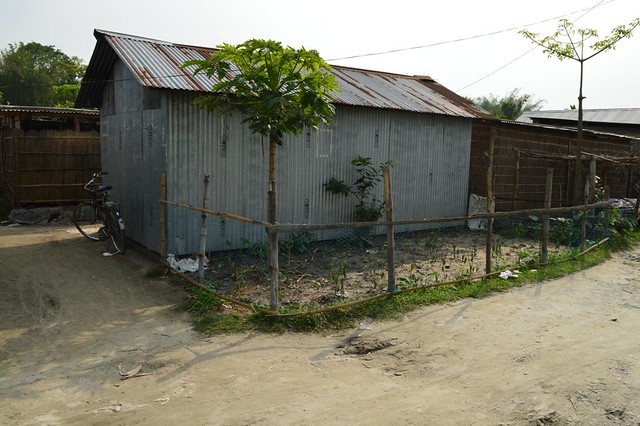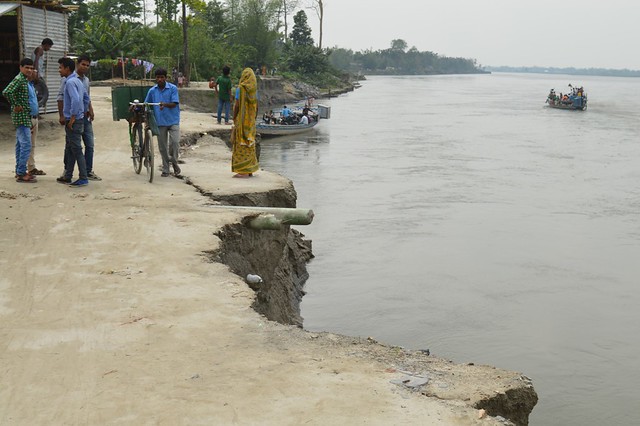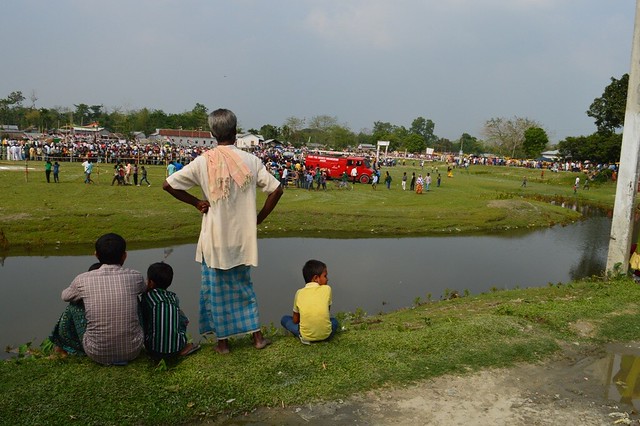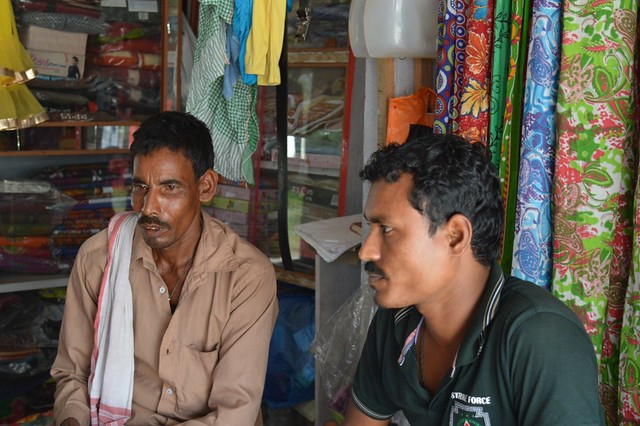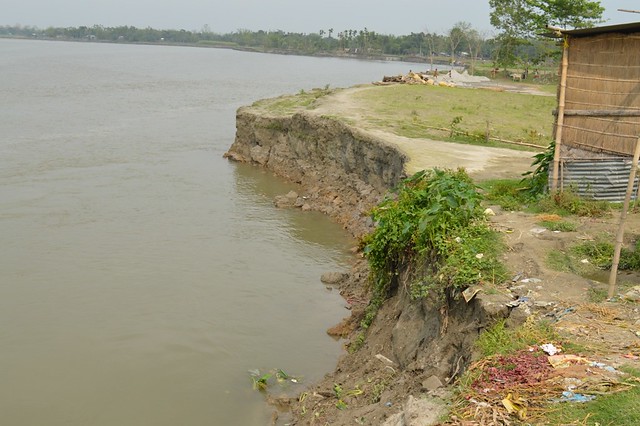By Amit Kumar, TwoCircles.net
Jania (Barpeta): Kalampur, Sonpura, Islampur and Shutripata are villages that you will no longer be able to locate when you arrive in Jania, Barpeta. These villages only exist in people’s memories and on the voter IDs of people who once lived in these villages, for these are among the many villages that have been lost permanently to land erosion in this constituency. The citizens of these villages now share a 32-bigha camp near the Jania High School in houses made of asbestos sheets. The asbestos sheet is now the most common material for building purposes in Jania as no one wants to take the risk of spending on Pucca structures.
In the foreground, a massive rally for the Congress candidate Abdul Khaliq was being organised; his praises being sung along with Rahul Gandhi and Sonia Gandhi. Lal Mahmud, a shop owner in the village, was both confused and angry at the same time. “For years, we have been told that vote for us, we will make amends,” he says in a dismissive tone, adding, “None of these parties or their candidates has a clue about how to stop erosion. They want us to believe what they say, but how will they deny what is happening on a daily basis?” he asks. He is lucky, he says, that he is not a farmer and that his shop helps him earn a regular livelihood in this constituency, at least for the time being.
As far as elections go, this is a standard affair: Jania, a Muslim-dominated constituency, is represented by Hafiz Rafiqul Islam of the AIUDF. His tenure, his supporters say, has seen development, but when probed further, they are unable to add much to it and instead, explain why the Congress must be defeated since their government has done little for this area. The Congress supporters, on the other hand, point out that the Fakhruddin Ali Ahmed Medical College, Barpeta, was built by their government and say that to ensure more such development projects, one should vote for Congress. Understanding the politics of the local place, the BJP too has nominated a Muslim lady, Banerjee Arhan.
Land erosion: The water has no boundaries
The problem of land erosion in Assam isn’t a new one: in fact, in a Chai shop next to river Beki, the old-timers argue over whether this is 25 or a 30 year old problem in this area. Nevertheless, the only point they agree upon is that it matters little to the government. Their lives have been ruined over time so much so that now, displacement has become the new order in life, an event that repeats itself every 2-3 years; or sometimes even faster.
Ekkabara Khan, 55, has been displaced over six times in his life, so much so that from the current place where his asbestos chai shop stands, he is a little confused when pointing out where his real village was. “Maybe somewhere over there,” he points across the river, though he is also sure it could have been a km away from where he is pointing to. “I have been moving, rebuilding, for the past so many years that now, when people talk of elections and voting for some person because he/she will work, I have nothing to say but laugh,” he says.
“Ask one person sitting here: have they received any compensation? Any support from the government? We are refugees in our own land,” he says, to a loud cheer from his customers. Usman Ghani, a 60-year-old, lost all his land about 6-7 years ago, and since then, a relatively comfortable life has made way for a daily wage laborer’s struggle. He now stays in the Jania Camp along with about 150-odd families and says that the land erosion is not something that can be fixed by one party or the other. “The damage is irrecoverable; so is the loss of income. How does one recover land? I can no longer be a farmer and neither can anyone in my family,” he says.
Indeed, the biggest sufferers of the land erosions have been farmers who lost everything and have been reduced to earning a livelihood as labourers working as masons, mechanics or in brick kilns across Assam. The river Beki, which, at one point of time was nearly 10 kms from Jania, now flows right below their feet almost and chops off land on a daily basis. Monawar Khan, a student at Burdhwan University, says his family is scared even though they live nearly 5 kms from the river.
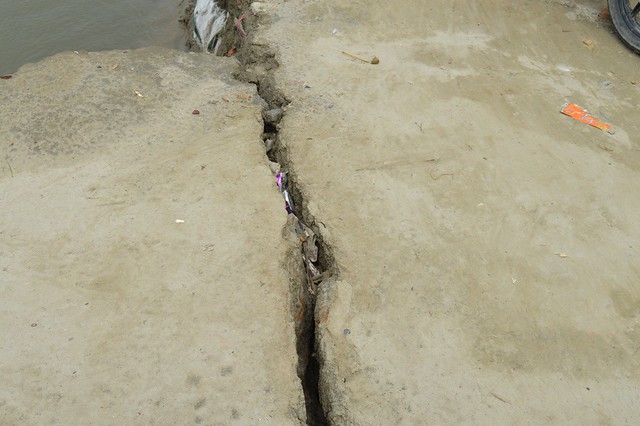
“Every monsoon season, the river is getting closer and the boats, which used to anchor far away, now do so right here,” he says pointing to the ground below. For Hussain, the only hope now is to find a job after he completes his master’s in Economics, so that he can find his family a place to live safely. “Who knows if this place will survive? My mother’s
Others, like Ainul Haque, are not so lucky. A former farmer, Haque now runs a shop selling day-to-day items and like all structures in this area, his shop is also made of asbestos sheets. “I can guarantee you that after the monsoons, I won’t be here and will have to move again. The land offers no resistance and is simply washed away by the currents,” he said.
“The governments have tried at times to check the erosion. They tried putting cement boulders across the edges, but they too got washed away,” he adds.
Babul Ali, also a former farmer who now works six months as a labourer in Guwahati and Silchar, says that the camp is a prime example of how little the government has cared for them. “We have been here for six years yet our voter ID cards says the name of our villages that no longer exist. It shows that the government is scared to give us proper rights in our camps; that we will always remain displaced,” he says. “Even though we have voting rights unlike so many others, our situation is no different,” he adds.
Doubtful voters: Nearly two decades and counting
For Jania residents, the subject of voting itself is a critical issue: almost every one we spoke to stated in the beginning itself whether they were allowed to vote or not. Since 1997, this has been an issue that has divided the society and often, families too.
Rashidul Islam is a 32-year-old computer operator in the nomination cell of the Electoral office in Barpeta. The soft-spoken man has, during his work, seen hundreds of doubtful voters, and firmly believes that the issue has been ignored for far too long. “I am a voter, so was my father before he passed away. But somehow, my mother was listed as a doubtful voter even though she has never lived anywhere except in Jania. After a person is listed as a doubtful voter, he/she receives a notice from the SP Barpeta office, after which their case goes to the Foreigner’s Tribunal.
“Even after 19 years, my mother hasn’t received a notice. At the same time, we don’t want to challenge it because it costs almost Rs 20,000 in expenses and we simply cannot afford that much,” Islam adds. The more famous case in Barpeta of a doubtful voter in Barpeta is that of Shahjahan Kazi, who has worked as a polling officer over eight elections, but he is not allowed to vote because he too, is a D-voter. “You see the joke, don’t you?”asks Islam, laughingly.


